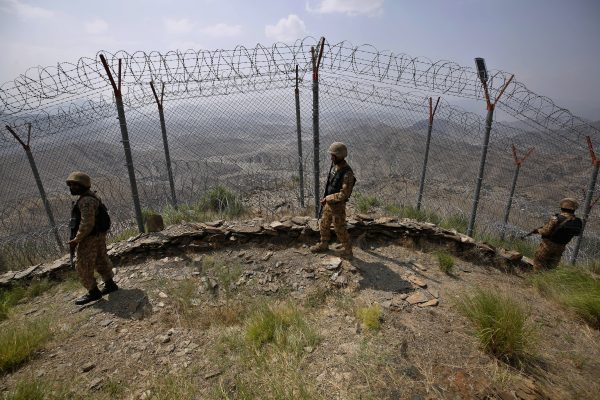
Source: The Diplomat/ AP
Hassan Tahir
Pakistan-Afghanistan relations have become more challenging, with both countries being at loggerheads over sensitive issues concerning security and sovereignty. Since the Afghan Taliban regained control of Afghanistan in August 2021, the number of terrorist incidents in Pakistan has increased precipitously. This is not good news for Islamabad, especially at a time when it is grappling with enormous political and economic challenges.
The year 2023 has witnessed an exponential surge in terrorist incidents inside Pakistan. As per the number released by Pakistan Institute of Conflict and Security Studies (PICSS), 136 people were killed in 65 militant attacks across the country during September, whereas in August alone, the country witnessed an 83 percent spike in militant attacks in a single month since 2014. According to a report published by the Centre for Research and Security Studies (CRSS). 386 people, including security personnel, lost their lives in the three quarters of 2023 in the fight against terrorism.
The Afghan Taliban’s return to power 2021, after the hasty withdrawal of U.S.-led forces from Afghanistan, was seen with more than cautious optimism in Pakistan. However, as far as terrorism is concerned, the situation has become more dangerous. From August 2021 onwards, a phenomenal uptick in terrorist attacks has been witnessed in Pakistan. The main source of this renewed terrorism has been the regrouping of the Tehrik-i-Taliban Pakistan (TTP). While the TTP has regained operational prowess, the Afghan Taliban have been unable to take concrete action against the said group which continues to use Afghan soil for inimical purposes against Pakistan.
The Afghan Taliban’s inability to act against the TTP has become a bone of contention between Afghanistan and Pakistan. This has created a degree of misgiving and trust deficit between the two countries. These fissures widened on Pakistan’s Defense Day, when a well-armed contingent of TTP fighters launched a brazen attack in Chitral (a Northern mountainous region of Pakistan). Initially, the Pakistan Army engaged the militants in a fierce battle and repulsed the attack, but a group of terrorists managed to sneak into the Pakistani side. This intense exchange led to casualties on both sides. Also, this happened to be the first major incident in Chitral, an area that has remained peaceful. More worryingly, Pakistani and Afghan security forces traded fire at the strategically important Torkham border hours after the intrusion in Chitral. The situation simmered, resulting in a 9-day closure of the said crossing.
Subsequently, Islamabad launched a marathon diplomatic mission to Kabul, testing the waters and sharing its concerns about the impunity with which the TTP uses Afghan territory to carry out terrorism. However, Afghan Taliban’s engagements in diplomatic parleys, pledges, and commitments have done little to redress the situation. This is evidenced by the continued escalation in terrorism inside Pakistan. On September 29, a series of militant attacks rattled Pakistan that was observing 12th Rabi-Ul-Awal. These dastardly attacks resulted in close to 70 casualties. Such brazenness demonstrated militants’ resolve to expand the scale of their fight with Pakistan. Here, it is important to note that the Afghan Taliban’s reticence to clamp down on anti-Pakistan groups, especially the TTP, will further vitiate ties between Kabul and Islamabad, something which both cannot afford.
Frustrated over Kabul’s inaction, Islamabad seems committed to taking measures to protect its national interests. Actions against smuggling and the expulsion of undocumented refugees could be considered some of the ways through which Pakistan wants to pressure the Afghan Taliban into to taking substantive action against the TTP. This, however, might not be enough, and therefore Pakistan has to devise a comprehensive strategy to deal with its Afghan and terrorism problems. This is primarily because the TTP does get emboldened because of the Afghan Taliban’s refusal to act against it. Pakistan, at least for a foreseeable future, should not expect the Afghan Taliban to pull the plug on the TTP.
With all this in mind, Pakistan must prepare for yet another protracted conflict in its northwestern region. A multi-pronged approach comprising diplomacy, counterterrorism, and economic development must be adopted to deal with these complex sets of problems. Pakistan’s diplomatic initiatives must focus on getting this message across to Afghan authorities: Pakistan believes in creating the conditions to enhance the prospect of mutual prosperity, chief among them being an end to cross-border terrorism. In other words, Pakistan must convey the cost of breaching red lines, be they through attempts to disrupt work on border fencing, or extending support to the TTP. In this regard, Pakistan must also demonstrate its willingness to exercise a range of policy options to impose costs, should the situation deteriorate. This has to be complemented by a renewed focus on kinetic and non-kinetic counterterrorism actions in the areas bordering Afghanistan. Targeted and intelligence-based operations must be launched more frequently, with a view to interdicting and pre-empting militants. This has to be done in concert with work aimed at buttressing and streamlining border management and surveillance. On the non-kinetic front, the erstwhile Tribal Areas must be fully mainstreamed through a bevy of legal, political, and economic reforms. Absent these wide-ranging interventions, these undeveloped areas will become fertile grounds for the TTP and other outfits. The Government of Pakistan can consider extending the scope of the Special Investment Facilitation Council (SIFC) to the areas bordering Afghanistan, with special emphasis on agriculture and mining as they have great potential. If economic activity is generated in these areas, it will have a positive effect on Afghanistan, too given that trade and employment opportunities might open up.
Therefore, while Pakistan’s Afghan challenge is a formidable one, it can be tackled with deft, foresight, and the adoption of a multilayered approach.
Hassan Tahir is Research Associate, Center for Security, Strategy and Policy Research (CSSPR), The University of Lahore.
The views expressed in this article are those of the author and do not necessarily reflect the position of the organization.




